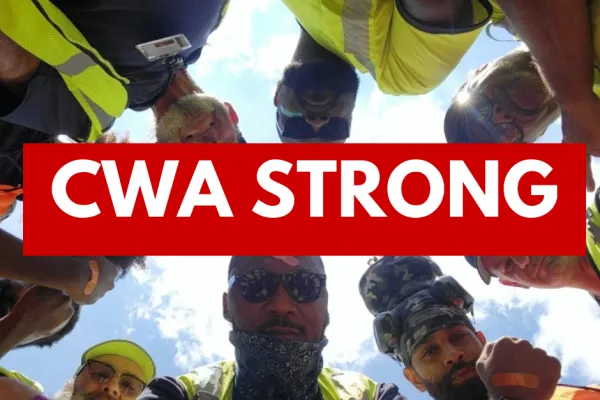CWA Member Survey Improves FAA Reauthorization Bill

Following the tragic deaths of two Piedmont agents and members of CWA Local 3645, Courtney Edwards in December 2022 and Kendrick Darrell Hudson in August 2019, CWA conducted a safety survey earlier this year. Responses by 785 Piedmont and Envoy agents across the country exposed the fact that many CWA Passenger Service Agents face serious safety hazards on the job.
CWA recently learned that most of the language we have advocated around safety on the ramps is now part of the House and Senate versions of the 2023 FAA Reauthorization bill. The language draws in part on essential information provided in the survey of Piedmont and Envoy agents. Those powerful survey results are summarized below.
Summary of the 2023 Safety Survey
Ramp agents reported performing their duties while being improperly trained to recognize when key aircraft safety hazards were present. One respondent said, “Training procedures [do] not match the [day-to-day] operation; they're totally different [in] practice from procedure.”
Two-thirds of ramp agents reported they always, often, or sometimes perform their duties while an aircraft engine is “spooling down” when parked at the gate, and more than one-third said they received no training specifically about airplane engine ingestion hazards, which occur in areas where they load and unload bags.
A quarter of ramp agents reported receiving no training about the dangers of airplane jet blast zones.
14% of ramp agents reported they are not trained on how to safely service an aircraft within the “safety envelope” for each plane, and 12% said the safety envelope is not marked on the tarmac at their stations.
Agents frequently reported working with inoperable or malfunctioning equipment, which exposes them to the risk of serious injuries.
27% of agents reported most or all of the equipment they work with is unsafe to operate, and 40% reported borrowing equipment, including belt loaders and aircraft tugs, from other airlines in order to perform their duties.
Agents also said they regularly work under significant time pressures imposed by the airlines. One agent said they regularly have less than 30 minutes to service an aircraft, and “machinery operates very slowly or is in disrepair,” which slows down the work. Another explained that although the airline says safety is more important than on-time flights, “There are more severe repercussions for having a flight go out late than for an injury.”
A full 45% of respondents said they do not have enough time to safely perform their jobs, and 47% reported they have been asked to cut corners or rush to perform their duties. According to one respondent:
“There is always an unspoken feeling that we need to rush. On time performance and turn gain time are metrics we are reminded of. AA is somewhat complicit in this since they rank the ground handlers by on-time performance, which can make some employees feel they need to work faster to save their jobs.”
Severe understaffing often compounds the problem of time pressure, with 63% of agents reporting not enough staff to allow everyone to perform safely. One agent noted, “Part-timers working five days a week create exhaustion, especially for those working more than one job.”
Although the House version of the FAA Reauthorization as yet does not include language around training, CWA continues to work with members of Congress to improve both the House and Senate bills, including the language around assaults on agents.



